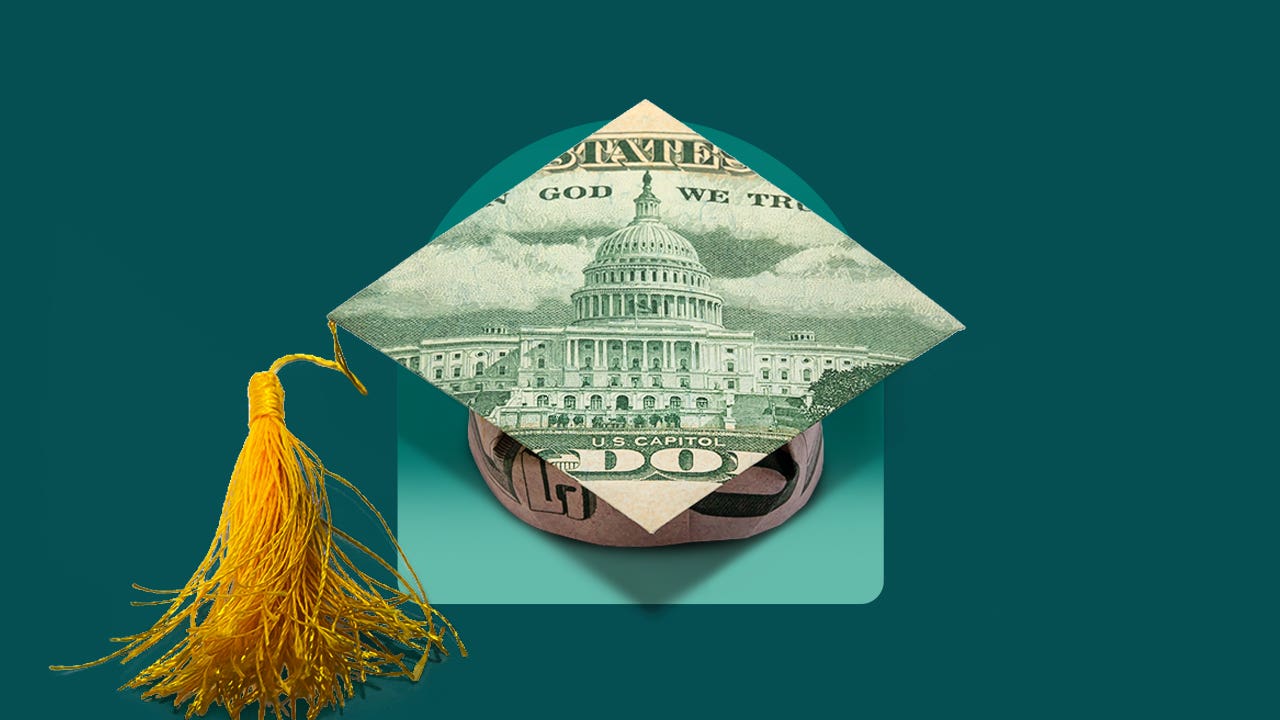Should I take out student loans? Steps to help you decide

Key takeaways
- A student loan can be a valuable financial tool if it’s part of a clear career plan.
- Average tuition costs can push the total bill for a four-year degree to over $100,000 even at an in-state public school.
- The more you borrow in student loans, the lower your return on education investment.
- The average bachelor’s degree recipient makes 50 percent more than a person with a high school diploma.
Should I take out student loans to pay for college? This is one of the most critical and complicated questions most high school graduates and their parents grapple with when considering a college education. College tuition costs have more than tripled over the last forty years and don’t show signs of moderating any time soon.
The past several years of spiking inflation have added to the financial burden, making day-to-day living more expensive. The higher cost of living makes it more likely you may need a student loan to cover part, if not all, of your college expenses.
However, a college degree’s value often offsets the cost of student loans. Do some homework before applying for college to discover whether this is likely to be true for you.
Should I get a student loan?
A student loan makes sense if it’s part of a thoroughly researched plan that considers your career goals, realistic income expectations and a solid understanding of how student loans work. The simple truth is that the more you borrow, the more you’ll need to earn after college to pay the balance off, plus interest.
If you clearly understand the factors that determine your college education’s return on investment, you’ll better understand whether a student loan is worth it.
Research career options first
With average tuition costs running over $10,000 per year for an in-state public four-year college, it’s more important than ever to have at least a general idea of a career you’re interested in. Learning the average starting salaries for college graduates now could help you avoid the frustration of small paychecks once you graduate. Plus, changing directions mid-degree can also mean paying more in tuition if it means taking additional courses or staying extra semesters.
Find out if you need a degree
Not all careers require a college degree. By choosing college degree alternatives, you may get paid while gaining valuable experience. Trade and technical schools can train you to learn a specific skill, and many schools offer apprenticeships that can lead to employment.
If you’re interested in a particular company or job, find out if it offers internships. Spending a few weeks in the thick of it may help you confirm — or rule out — the type of work you want to spend 40 or more hours a week doing.
Shop the tuition costs at several different colleges
How much student loan money you’ll need depends on the education costs at the school you choose. The average cost of tuition for a four-year degree at a private nonprofit college is nearly four times higher than that of a four-year in-state college. And don’t forget to budget for room and board (if you live on campus), books, supplies and other expenses.
Carefully consider whether a degree from a prestigious private university is worth the extra expense. In many cases, you can get an excellent — and less costly — education from an in-state public university and significantly reduce your student loan costs.
Average costs of college per academic year by school sector, 2024-2025
| Cost type | In-state public four-year | Out-of-state public four-year | Private nonprofit four-year |
|---|---|---|---|
| Tuition and fees | $11,610 | $30,780 | $43,350 |
| Room and board | $13,310 | $13,310 | $15,250 |
| Books and supplies, transportation and other expenses | $4,990 | $4,990 | $4,390 |
| Total cost for one academic year | $29,910 | $$49,080 | $62,990 |
Research different student loan options
You may choose between two types of student loans: federal and private. Federal student loans typically offer the lowest interest rate and are relatively easy to qualify for. They also give you more repayment options after graduation, including income-based repayment options matching your payments to your earnings.
Private student loan rates are generally higher than federal student loan rates, with less repayment flexibility. However, they can be helpful if you need a small amount to finish your undergraduate degree. Some private lenders even offer merit-based lending that allows you to qualify based on academic excellence rather than credit and income.
The interest rate you pay on any student loan directly impacts the return on your college education expenses. The less interest you pay, the better your return will be.
Calculate the return on investment (ROI) for a financed college education
Return on investment is more commonly tied to investing in the stock market. However, you can use the same principle to compare career and college options. To calculate the ROI there are three things to consider:
- The difference between earnings with and without a college degree. Data from the Bureau of Labor Statistics shows that people with a high school diploma earn 50% less than those with a bachelor’s degree.
- The cost of getting a degree. Be sure to add costs like books and supplies you’ll need during your education.
- Your student loan repayment period. Most student loan repayment periods can be spread out to 20 years. However, the longer you take to repay, the more total interest you’ll pay. Use a student loan calculator to determine the total amount you’ll pay, including interest, for the most accurate ROI figures.
Let’s look at the numbers if you:
- Make a salary of $68,700
- Take out $200,000 in student loans paid off over 20 years at 5% percent interest
- Attend an out-of-state public four-year graduate degree
| Projected degree earnings over 20 years ($68,500 x 50% x 20 years) |
$687,000 |
| Total principal and interest payments on $200,000 over 20 years at 5% | $316,778.40 |
| ROI for a student loan-financed college degree | 216.87% ROI |
Things to consider:
- You will continue earning after your student loans are fully repaid.
- To pay off the $200k over 20 years, you’d pay a little over $1,319 monthly. This would affect your ability to qualify for other financing for car and home loans.
- The $200,000 student loan balance will accrue over $116,000 in interest. If you decide not to take out loans to pay for your education, that money could be invested in a growth fund or 401(k).
- These numbers are based on a 5 percent interest rate, which is usually available to good credit borrowers. Having to get a bad credit student loan may significantly reduce your ROI.
Complete the FAFSA to minimize your student loan amount
Once you’ve crunched your worst-case numbers, which involve borrowing money to pay for your entire education, it’s time to determine how much financial aid you qualify for. This means filling out the Free Application for Federal Student Aid form, more commonly known as FAFSA.
You’ll find out whether you’re eligible for scholarships and grants, which can significantly reduce the amount you need to borrow. You may even be eligible for work-study programs, which allow you to earn money while you work in a job related to your major.
Research private scholarships and apply for them as early as possible. Over 1.8 million scholarships are awarded annually.
Know your repayment plan options
In most cases, you’ll need to start repaying federal and private student loans six months after graduation or drop below half-time enrollment. This gives you some time to job hunt for the highest-paying position possible before your student loan payments begin.
Most federal student loans offer an income-driven repayment plan, meaning your payment is tied to your earnings. However, that’s not typically an option for private student loans you may have taken out.
If interest rates are falling, you may qualify for a loan refinance, which could help you reduce your interest costs and pay your loan balance off faster.
Ask your accountant about student loan tax deductions
You can take advantage of student loan tax benefits if you’re eligible for the American opportunity tax credit or the lifetime learning credit. Access to both is limited based on your income.
The American opportunity tax credit allows you to claim up to $2,500 in tax credits for each of the first four years of college. The lifetime learning credit allows you to claim up to $2,000 based on college or career tuition fees, including equipment required for applicable coursework. You cannot use both in the same year.
Don’t count on student loan forgiveness
Even if you are eligible for a forgiveness program like Public Service Loan Forgiveness, you must make payments until your forgiveness request is approved, which could take months or years.
If you decide to enter the workforce before you go to college, ask your employer if they offer any tuition reimbursement or assistance options to pursue a degree that matches your job.
Bottom line
It’s best to use cash or money from a 529 college savings plan to pay for school. However, student loans are worth it if you’ve got a solid grasp of your career goals and a clear understanding of the earnings potential in your field. Always research different loan options and be sure you know the requirements for how to repay the loan once you graduate.
A little bit of proactive planning before you go to college could exponentially increase the return on investment in your higher education.







